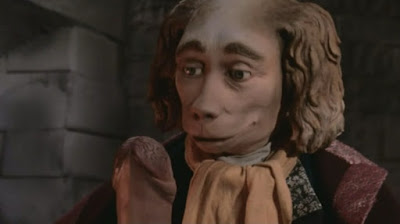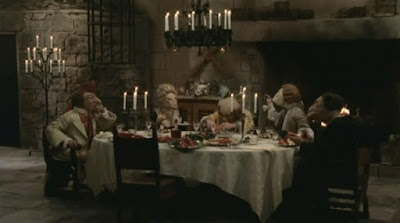Marquis is quite the creation. I never knew of its existence until recently. It’s a little like the movie Quills (2000) but with anthropomorphic characters who look like they’ve escaped from Alice in Wonderland. It is set in 1789, shortly before the Storming of the Bastille, in Paris France. The lead character (Francois Marthouret) is an inmate of the Bastille, who is referred to as Marquis and is a talented writer of erotic, violent, and depraved manuscripts. He is not necessarily alone, for his sizeable member who goes by Colin (Valerie Kling) is his close companion, consultant, and conversationalist. In between writing various pieces of salacious stories, Marquis finds himself participating in a ploy to help free a political prisoner, Lupino (Roger Crouzet), for the sake of the Revolution. Another imprisoned woman, Justine (Isabelle Wolfe), who was raped and impregnated by the king, is eventually thrown into the same cell as the Marquis, as a corrupt priest, Dom Pompero (Vicky Messica), intends to divert the blame on to him and cover up the king’s misdeed, but Justine instead finds the Marquis to be a gentleman and an enthralling storyteller.
I’d never thought I’d be writing about a French/Belgian animal costume comedy depicting a fictional (although historically inspired) account of the Marquis de Sade, with numerous characters portrayed by different types of peculiar looking animals (that were originally designed by Roland Topor). This is one of those “why does it even exist?” sort of things, but I’m glad it does. It really is funny at times and quite brilliant. The background setting of the Bastille is depressing and the human animal characters give me the creeps, but there is something beautiful about it as well, especially the classical intro theme by Reinhardt Wagner with its soprano vocals. It also has the charm of a well-done costume play that would’ve gotten my attention as a kid, even though, as the poster says, this is for mature audiences only.
Director and co-writer Henri Xhonneux and co-writer Roland Topor seem to express a fitting knowledge and appreciation for the writings and life of the Marquis de Sade in the film. The character representing Sade is respectfully presented as a talented and inspirational writer who is locked up for committing blasphemies (as an anthropomorph, he reminds me of a cocker spaniel). Interestingly, he is never referred to as Marquis de Sade, but rather simply as Marquis, with the name Sade being used anonymously by the priest, who steals and profits financially and socially from the manuscripts Marquis pens during his imprisonment.
The film paints the Marquis as quite the kind and mild-mannered man, a “good guy” in the story (no mad sadistic side in sight). The depravity and debauchery that characterizes Sade’s writing instead surround him. The authorities and religious leaders are corrupt hypocrites who are persecuting someone who only writes about what they practice. I like the idea of the Marquis as not evil in person but rather someone who understood evil, corruption, and debauchery enough to accurately put it to paper, being witness to the most depraved and hypocritical of leaders, rulers, and priests.
One of the more peculiar draws here is the character of Colin, the Marquis’ fairly large sexual appendage, an adorable puppet protruding from his pants. Colin is Marquis’ friend and confidant, who he nonchalantly has conversations and civil arguments with, which is surreal and comical. He is someone Marquis debates with over writing inspiration or criticism. Colin’s face peers out from the foreskin, with the tip of his head made to resemble a brain (a source of erotic knowledge?). Colin, who Marquis consults with democratically, is also polite and soft-spoken. Marquis argues with Colin as to whether his inspiration mostly comes from his mind or the brain of his member, who speaks to him so lightly and delicately, which is funny because, knowing Marquis de Sade, I’d assume it was rather passionately and violently. Colin is fitted with a wig at one point and made to perform on a miniature stage Marquis constructed, and it’s honestly the cutest thing you’ll ever see.
My favorite books from de Sade are Justine (1791) and Juliette (1797), the titles of which are also the names of two other significant characters in the film. They’re not presented as sisters, as in the books, but I do like the take on the characters here. The woeful Justine is portrayed as a cow, who is apparently thrown in prison to coverup that she is pregnant with the king’s child. I was surprised at the chemistry the Marquis and Justine have when she is locked in the same cell with him only to be regaled by his literature and to show such impressive ingenuity in helping to comfort and revive Colin. You really do eventually end up feeling sorry for the poor, unfortunate Justine. The noblewoman Juliette, portrayed as a horse, is a dominatrix and pro-revolutionary seducing and playing the rooster governor of the Bastille, Gaetan de Preaubois (Rene Lebrun), as a ruse for the Revolution.
Marquis is a weirdly fun time and a nice way to get your de Sade movie fix, especially if you are a fan of the movie Quills. It’s also not really that sadistic or depraved, but it is still quite fitting for fans of Sade’s writing. Anyone interested in a cartoony, albeit adult, story set during the French Revolution might find enjoyment as well. It’s mostly live action, but there are some neat Claymation segments, particularly the story scenes from Marquis' writings as well as hallucinations and a particular Burton-esque dream he has. The animatronic animal masks and costumes, realized by Jacques Gastineau, really aren’t bad at all. My mind was tricked into believing the characters were talking animals without thinking so much about the human actors underneath.
It’s fairly obvious that de Sade is being romanticized here. Judging from the historical accounts of his unsavory crimes, it’s hard to imagine that the real de Sade was at all like the kind, mild-mannered Marquis from this film, but it could have been possible. It’s nice to sometimes imagine he might have been a misunderstood writer who understood vice and depravity, but I can’t help thinking he most likely was an entirely evil writer, who’s wicked philosophical writing could actually be considered dangerous.
Do not count me as a follower of Sade’s philosophy, but as a reader of his works I do appreciate the unfiltered perspective of evil as it is innate to nature. From his writings, Sade reveals repeatedly the full potential for cruelty that we are capable of, something nature has embedded in our DNA, likely more for some than others. By being enthralled by Sade, we should not be promoting evil but learning to recognize and understand it, as well as finding some kind of curious relief and even entertainment. Just as when we want to see a balls-out horror movie that pulls no punches, we can also find an odd fulfillment from Sade’s text that reveals the cruel, twisted emotions and intentions a serial killer would have, but elaborated in such a coldly rational, captivating, and elegant way. There’s a certain kind of catharsis you can find by indulging in stuff you’re not supposed to think, read, or write, and Sade’s got us covered there. To reword a fantastic idea from John Waters, get the most out of life and read a fucked-up book.
© At the Mansion of Madness



















No comments:
Post a Comment